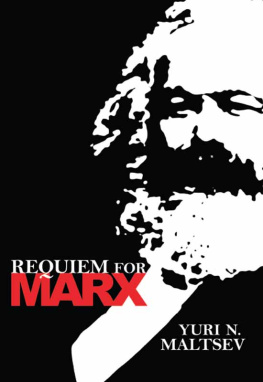REQUIEM
for MARX
Edited with an introduction by
Yuri N. Maltsev
LUDWIG VON MISES
INSTITUTE | Ludwig von Mises Institute
Auburn University, Alabama 36849-5301 |

Copyright 1993 by the Ludwig von Mises Institute
All rights reserved. Written permission must be secured from the publisher to use or reproduce any part of this book, except for brief quotations in critical review or articles.
Published by Praxeology Press of the Ludwig von Mises Institute, Auburn University, Auburn, Alabama 36849.
Printed in the United States of America.
Library of Congress Catalog Card Number: 93-083763
ISBN 0-945466-13-7
Contents
The Ludwig von Mises Institute gratefully acknowledges the generosity of its Members, who made the publication of this book possible. In particular, it wishes to thank the following Patrons:
Mark M. Adamo
O. P. Alford, III
Anonymous (2)
Everett Berg
EBCO Enterprises
Burton S. Blumert
John Hamilton Bolstad
Franklin M. Buchta
Christopher P. Condon
Charles G. Dannelly
Mr. and Mrs. William C. Daywitt
Tad Dekko
Kendall, USA
Robert T. Dofflemyer
Mrs. Card G. Elliott, Jr.
Dr. James W. Esler, Jr.
Willard Fischer
James W. Frevert
Thomas E. Gee
Franklin Lee Johnson
Andrew P. Jones
Dr. Richard J. Kossmann
Helen H. Lea
Hugh E. Ledbetter
Charles H. Mason
William W. Massey, Jr.
James R. Merrell
Dr. Matthew T. Monroe
Lawrence A. Myers
Dr. Richard W. Pooley
Dr. Francis Powers
Mr. and Mrs. Harold Ranstad
James M. Rodney
Catherine Dixon Roland
Leslie Rose
Gary G. Schlarbaum
Edward Schoppe, Jr.
Raleigh L. Shaklee
Raymond Shamie
E. D. Shaw
Shaw Oxygen Company
Richard J. Stephenson
Donald R. Stewart, Jr.
Twin Oil Company
David F. Swain, Jr.
Loronzo H. Thomson
L. H. Thomson Company
top dog
Edgar J. Uihlein
Joe Vierra
Paul Vlahos
Robert S. Young
Young Electric Company
Introduction
L enins slogan, Marxism is Almighty Because It Is True, was displayed practically everywhere in the former Soviet Union. My first encounter with Karl Marx came in the first grade of elementary school in the city of Kazan on the bank of the great Volga River. His picture was printed on the first page of the first textbook I opened. Dedushka Marx (Grandfather Marx), said the teacher pointing to the picture. I was thrilled, for both of my grandfathers died during Stalins purges in the 1930s. I ran home to my grandma to tell her she was wrong. I have a grandpa, I said, and with his huge beard and smiling eyes, he looks like Father Frost (the Soviet/atheist version of Santa Claus or Saint Nicholas, the patron saint of Russia).
Growing up in the Soviet Union, such early confusions are soon cleared up, for studies in Marxism were an unavoidable experience for everyone irrespective of age, class, social position, or nationality. Even the convicts in prison, including those on death row, studied the Shining Heights of the great liberating teacher. The works of Marx, Engels, and Lenin were published in the USSR in 173 languages with a total output of 480 million copies. Many of them were exported. I once met an Indian translator hired by the Political Publishing House to translate 50 volumes of the Collected Works of Marx and Engels into Malaylam. He complained the project was stalled because the Soviet propaganda officers could not find another Malaylam translator to cross check his work.
In the Soviet Union, Marxism was not thought to be just an economic theory. It pretended to be the universal explanation of It was also a deadly weapon to be wielded against personal enemies. As in the case of Sergei Vavilov who was starved to death for violating Marxism because he adhered to the science of genetics, a false science invented by the Catholic monk Mendel. In the name of Marxism, the death toll reached 100 million, the rivers of blood flowed from Russia to Kampuchea, from China to Czechoslovakia.
Hatred was the chief motivator of the socialist revolutionaries and their followers. Lenin regarded politics as a branch of pest control; the aim of his operations was the extermination of cockroaches and bloodsucking spiders, the myriad persons who stood in the way of his political ambitions. Yet Western hagiographers have varnished over this atrocious callousness of Marxists, as historian Richard Pipes has documented.
One of the common denominators between Leninists and government interventionists in the West is the belief that the problems of monopoly are the problems of ownership: only private monopolies acting out of greed are harmful. These institutions are suppressing scientific and technical progress, polluting the environment, and engaging in other conspiracies against public well being. Government monopolies, however, were believed to be ethical and upright; they substituted the greed of the profit motive with a societal interest. Yet group bureaucrats who manage and operate the public sector are no less self interested than those who manage and operate private business. One important difference exists, though: unlike private entrepreneurs, they are not financially responsible for their actions and they operate without institutional constraints of cost control that private property and competition induces. The enlightened minds of planners and technocrats cannot overcome the problem of economic calculation without market signals.
The failure of socialism in Russia, and the enormous suffering and hardship of people in all socialist countries, is a powerful warning against socialism, statism, and interventionism in the West. We should all be thankful to the Soviets, says Paul Craig Roberts, because they have proved conclusively that socialism doesnt work. No one can say they didnt have enough power or enough bureaucracy or enough planners or they didnt go far enough.
In contrast to the West, where Marxist tenets were doctrines of a counter religion, few in the Soviet Union truly believed in the official ideology: not the state managers, not the professors, not the journalists. It was not necessary that they do so, for Marxism was a means of political rent seeking and of coercive control, not a body of ideas held to by honest men.
The Soviet Union is now gone, as are the huge statues of Marx and Lenin that littered the East, and the good reputation of their systems of thought. This collection of articles is the Requiem for Marx and the social and economic systems created in his name. As with any funeral service, we look back on the life of Marxian ideas. But unlike the ordinary funeral, we are not looking back fondly, for Marxism is as good an example of the maxim that ideas have consequences as can be found. It does not speak well of the intellectual class that no body of ideas attracted a greater following in this century.
It is beyond the capacity of economic analysis to calculate the opportunity costs of the socialist experiment in Russia. But the human toll from Stalins collectivization, purges, and Gulags is estimated by Russian historian Roy Medvedev at forty-one Gary Becker has said. It presents a mortal danger to economic freedom and the quality of life and will for generations to come.
The scholars contributing to this volume write in the economic and historical tradition of the Austrian school, founded by Carl Menger with his book













